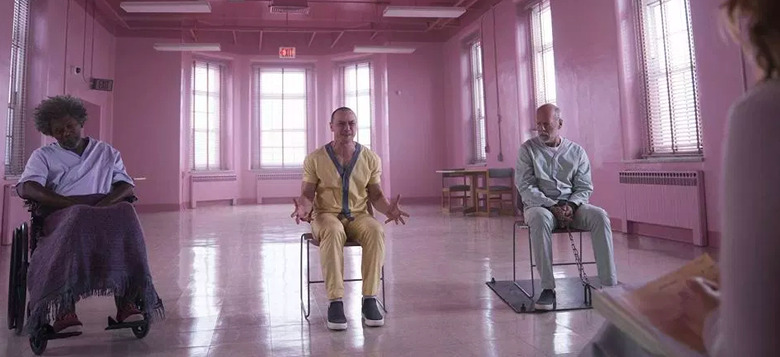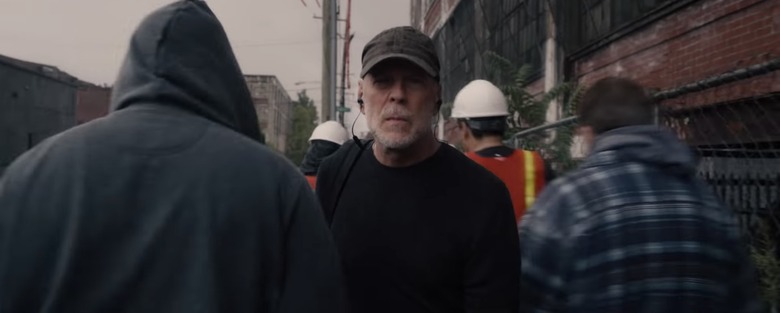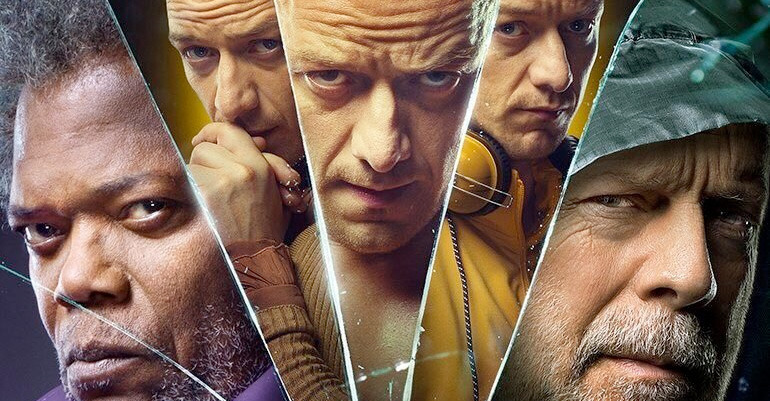The Unpopular Opinion: 'Glass' Is A Bold And Brilliant Climax To M. Night Shyamalan's Superhero Trilogy
(Welcome to The Unpopular Opinion, a series where a writer goes to the defense of a much-maligned film or sets their sights on a movie seemingly beloved by all. In this edition: M. Night Shyamalan's critically lambasted Glass is actually good!)Reactions from critics to the Unbreakable trilogy have grown increasingly divisive with each film – not unlike reactions to M. Night Shyamalan's work as a whole. It was only years later, after the subsequent surge of studio attempts to make "gritty" and "grounded" superhero movies, that appreciation for Unbreakable began to swell. And despite being hailed as part of Shyamalan's comeback, Split received more negative reviews than its predecessor upon its release in 2017.Two years later, it's hardly surprising that Shyamalan's trilogy-capper, Glass, has fared far worse among most critics than the films before it, and yet I find it to be a near-perfect culmination – and escalation – of this particular narrative. Glass continues the subversion and dissection of the superhero genre, while continuing to explore the compelling thematic elements at work in its predecessors – particularly those in Split. The cleverness of Glass extends beyond its mere plot points and transcends the expected Shyamalan twists, with a thoughtful aesthetic and self-aware implementation of the filmmaker's more heavy-handed tendencies.
This post contains spoilers for Glass.
What Happens When…
The basic premise of Glass takes that of Unbreakable and Split to their logical conclusion: The seemingly unbreakable David Dunn (Bruce Willis) has become a vigilante, dubbed by the media as "the overseer." Meanwhile, the exceptionally intelligent Mr. Glass (Samuel L. Jackson), who suffers from osteogenesis imperfecta (also known as "brittle bone disease"), has been locked away in a mental institution, where he is kept under heavy sedation. While out on one of his "walks" to fight crime, David stumbles upon Kevin Wendell Crumb (James McAvoy) and realizes that this is The Horde – the mentally ill man suffering from dissociative identity disorder (DID), whose undesirable identities have taken over in service of a violent, apex identity known as The Beast. In the midst of rescuing The Beast's latest "food" and confronting him, David is interrupted by a tactical team led by Dr. Ellie Staple (Sarah Paulson) – a psychologist who specializes in those suffering from the very specific delusion that they are superheroes or supervillains.In short order, David and Kevin are locked up in the mental institution alongside Mr. Glass, setting the stage for an epic showdown between good, evil, and the mastermind pulling all the strings. This set-up essentially asks the age-old paradoxical question: What happens when an unstoppable force (The Beast) meets an immovable object (David Dunn)? The nature of the paradox is such that the answer should be nothing at all because if an unstoppable force exists then it would discount the possibility of there being an immovable object, and vice versa, and yet it does not account for the element of chaos – or, in this instance, two elements of chaos: Mr. Glass and Dr. Staple, the latter of whom has three days to convince these three men that they are not actually super-powered. The thrust of Dr. Staple's work is a thematic answer to the aforementioned paradox, though it functions as more of a provocation; it is the intersection of the rational and irrational, the objective and subjective, and the explicable and the inexplicable.
Thematically Speaking
Glass continues Split's perception of and preoccupation with trauma and its transformative power. It's no coincidence that Kevin's various identities – formed to cope with his childhood trauma and shield him from further pain – are referred to as "alters"; each of them represent the ways in which Kevin has been altered by his mother's abuse and his father's absence – the latter of which is explained in a third-act reveal (more on this in a bit). Once again, it is Casey who is able to get through to Kevin – the real Kevin – because her own trauma has given her the ability (or "power") to see beyond his actions and empathize with the human being behind the beast. David Dunn and Mr. Glass are given additional depth and dimension as Shyamalan reveals traumatic moments from their past – in David's case, it's something that Dr. Staple attempts to use against him. Trauma has the potential to make us stronger and more empathetic people (Casey), it has the power to break us into pieces and corrupt our psyche (Kevin), and it can be used as a weapon against us in our weakest moments (David).As with Split, McAvoy is the MVP, his performance as much of an escalation as everything else in Glass. McAvoy seamlessly transitions between identities – including a few previously unseen alters – with such ease, showcasing a versatility in skill and persona that made me wonder why no one has just asked him to host the Oscars already. Still, the best of these identities are Patricia (whose vocal timbre and physical posturing evoke Jude Law in drag) and Hedwig (aka the one identity I would most like to hang out with). Anya Taylor-Joy is a close runner-up, given her exceptional emotional chemistry with McAvoy, particularly in the film's later scenes. The vulnerability and commitment to the shared, scarred heart between these two hurt people keeps Glass grounded in a reality that is almost too horrible to fathom – and yet incredible relatable all the same.For much of the film's second act, the central conflict isn't between David and Mr. Glass/The Beast. It's actually between Dr. Staple and her patients as she tries to convince them that super-powers are not real and comic books are not myths that evolved from real-life superheroes and villains. While some have criticized Glass for spending too much time trying to disprove concepts that the previous films established as very real, Dr. Staple's pursuits are actually rather fitting – particularly as Mr. Glass and The Horde share the primary goal of showing the world what they really are.The real-world viewer may be aware that these men have super powers and inexplicable abilities, but the general public of Shyamalan's fictional universe has no idea that such people truly exist. Furthermore, there remains enough reasonable doubt as to the existence and extent of these powers – all of which can still be explained away to some degree. Sure, David is incredibly strong and empathic, but the former can be chalked up to adrenaline and intense self-actualization, while the latter isn't all that strange (think of a woman's intuition). Mr. Glass' only real power is that he's quite smart; it's his brittle bone disease that makes him believe he's destined to be the mastermind who pulls the strings from a distance. And Dr. Staple offers numerous examples to explain away The Beast's powers, from the way he bent those metal bars at the end of Split (they were old and weak) to his seeming ability to climb walls and ceilings (police found several videos on Kevin's computer of rock-climbing experts scaling the seemingly unscalable).There is an innate desire to believe in the unbelievable, and it's apparent that Shyamalan is aware of the covenant he's entering with the viewer – especially in the third film of a trilogy that has promised to deliver a conclusion worthy of its predecessors. That desire may not be entirely fulfilled (expectations are just disappointments waiting to happen), but it is echoed in the people who support Kevin, David, and Mr. Glass. Every woman who cares deeply for a broken man wants to believe he can be fixed. Every son wants to believe his dad is a superhero, impervious to pain and possibly even immortal. Every mother wants to believe her child is special and destined for greatness, and that they are, in their worst moments, merely misunderstood.The end of Glass leaves us with an optimistic development. Mr. Glass has committed atrocities; his actions are undeniably unforgivable. But in his ultimate act, he may have shed some light on the darkest corners of the world. Dr. Staple effectively epitomizes the bureaucracy that continues to stigmatize mental illness, placing a stifling umbrella over those who need help, simultaneously snuffing out everything that is "good" and "bad" about them. At one point, she asks David if he believes that he is good – despite the people he has hurt and the laws he has broken and the due process he has forsaken. But that's not a question that can be answered so easily. The world and the people in it cannot be classified in such binary terms. Like Kevin, we contain multitudes. Like Elijah, we have the capacity to commit horrible acts. Like Casey, we have the potential to transform pain into something useful. Dr. Staple's work encourages society to continue ignoring that which appears damaged, to lock them up indiscriminately in a system that is more broken than they could ever be – reinforcing their illnesses rather than rehabilitating them. It's not a leap to suggest that Shyamalan is contemplating or at least acknowledging our deeply, almost certainly irreparably flawed prison system. In one scene, Dr. Staple interviews all three men in a giant room painted a nauseating shade of light pink. It has a name: Baker-Miller pink or Schauss pink. In 1979, after conducting extensive research on the psychological and physiological effects of the color pink, Alexander Schauss convinced the directors of the Naval correctional institute in Seattle to paint some prison cell walls with this shade of pink. After the walls were painted, the correctional facility reported that there had been no further incidents of hostile behavior among inmates who were confined to the pink cells. That the room in which Dr. Staple conducts her final interview with David, Kevin, and Mr. Glass is painted this exact shade of pink is no coincidence.
There Are No Coincidences
If Unbreakable deconstructed comic book tropes, and Split subverted them, then Glass basically embraces them in a manner that transcends meta-commentary. There is literal commentary on comic book cliches throughout the film, from Mr. Glass proclaiming that this is the real origin story to his mother protesting the plot developments at every turn because this is not how her son said it would be – and he should know because he's spent his entire life immersed in these worlds. And while the literal commentary plays out on screen, Shyamalan's stylistic and thematic choices serve as commentary on the commentary.Of particular note is the aforementioned heavy-handedness, as if one could possibly expect for a film such as this one to be understated – that's like expecting Ryan Murphy to suddenly learn the art of subtlety. But Shyamalan has mastered what some may view as a weakness (not unlike how Casey has found strength in her trauma), and there are distinct moments in Glass where that perspicuity underscores another thematic element: There are no coincidences. In one scene, Casey is called into her principal's office at school, and as she walks down the hallway she passes a glass case featuring photos of past students – including David's son, Joseph. Shyamalan zooms in and holds for much longer than he should on this image.It's a choice that could be interpreted as downright silly, this filmmaker pointing out something so needless. But that choice speaks to our perception and consumption of superhero franchises, and the larger, seemingly improbable coincidences within. Why is it that we so readily and even eagerly accept that Iron Man and the Hulk and Captain America all function within the same universe? Why is it that we get a rush of excitement during the post-credits scenes, when one character crosses over into the story of another? Why are we so thrilled when Nick Fury shows up? (Which, by the way, only makes Shyamalan's reading of the genre even more bold.)If those coincidences and plot contrivances are accepted without question, then bringing these three super-powered men together under one roof and capping it with a conspiratorial third-act reveal shouldn't be any more absurd. Perhaps it is because Shyamalan's world is so "grounded" that people have a difficult time accepting it, and yet he has created a narrative in which superheroes are real. What did you expect?



